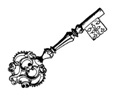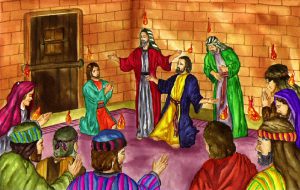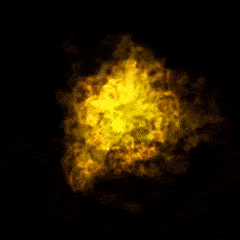1820AFC051818 – Double Birthday!
Read it online here, please. And please, when you visit there, use one of the social media links at the bottom of the page to share this post. Thank you! And remember, we now have a READER VIEW available, so share this link or this email often.
Acts 2:1-4 – 1 When the day of Pentecost had come, they were all together in one place.  2 And suddenly from heaven there came a sound like the rush of a violent wind, and it filled the entire house where they were sitting. 3 Divided tongues, as of fire, appeared among them, and a tongue rested on each of them. 4 All of them were filled with the Holy Spirit and began to speak in other languages, as the Spirit gave them ability.
2 And suddenly from heaven there came a sound like the rush of a violent wind, and it filled the entire house where they were sitting. 3 Divided tongues, as of fire, appeared among them, and a tongue rested on each of them. 4 All of them were filled with the Holy Spirit and began to speak in other languages, as the Spirit gave them ability.
Aloha nui loa, ʻŌmea! This is a BIG weekend for our house. Today, May 18th, is Crucita’s birthday. In a little twist on a popular saying, “She’s old enough to know better – and so she does better.”She is the zenith of integrity, super-smart, and the love of my life. We are preparing to celebrate our 50th Anniversary next year. This weekend is also the Birthday of the Church. This coming Sunday is the Feast of Pentecost. I want to spend a little time with you today talking about what Pentecost means, how and why the Feast originated, and why it is very important to understand it in the same context as the Early Church knew it. So, I wish a very happy birthday to my Dearest, Darling Wife, Crucita, and happy birthday Church. Now, what is Pentecost and why is it important to The Church today?
As Christians we think of it mostly in terms of the Second Chapter of Acts – the first four verses, the strong, driving wind, “cloven tongues as of fire,” speaking and prophesying in many languages (some of them possibly angelic languages), and Peter’s amazing proclamation of the Gospel. But what does it mean “… when the day of Pentecost was fully come?” Let’s look a little into what Pentecost is all about.
We begin by turning to Leviticus 23 where God is telling Moses about the feast days – Festivals – he wants celebrated. Leviticus is the third book of the Bible after Genesis and Exodus and the middle book of the Pentateuch, the first five books of the Hebrew Bible. The name Leviticus refers to the fact that most of the content of this book is the “Policy and Procedure Manual” for the Tribe of Levi, the Priestly Tribe. There are 27 chapters of rules, advice, and information on topics like sacrificial offerings, purity, holiness, the prescribed conduct and values for priesthood, rules for the sanctuary, and definitions and procedures for all of the feast days. In chapter 23, there are several feasts listed. They are given in the order in which they are to be observed and there is information on preparations for each and in some cases the reasons for the feasts and the rules that go with them.
Here are the feasts described in chapter 23, the section of Leviticus devoted to “Holiness Laws.” The Sabbath is described and then come other annual memorials. First comes Passover. Next is the Feast of Unleavened Bread which begins the day after Passover and lasts one week. During that time, Israelites ate unleavened bread. Then comes the Feast of Firstfruits, the day after Passover’s Sabbath, a Festival of Harvest and thanksgiving to God for the blessings of food. This was an offering made in hopes of further blessings from God. Usually this would be barley as it is one of the first grains to ripen.
Then there is the Festival of Trumpets, Rosh Hashanah which commemorates the creation of the world. No work was to be done on that day and all of Israel was to bring offerings to the temple when they heard the blast from the trumpets. This is the fifth of the Seven Feasts. The Feast of Trumpets begins on the first day of the seventh month. It is the opening Festival of the “High Holy Days.” These three feasts (Feast of the Trumpets, the Feast of Atonement – Yom Kippur, and the Feast of Tabernacles – Succoth) bring to a close the Liturgical Year of Israel and together foreshadow the Plan of Redemption made manifest in Jesus. So, the Seven Festivals are:
- Passover (Pesach)
2. Unleavened Bread (Chag Hamotzi)
3. Firstfruits (Yom Habikkurim)
4. Pentecost (Shavu’ot) The Feast of Weeks or Festival of Harvest
5. Trumpets (Yom Teru’ah)
6. Atonement (Yom Kippur)
7. Tablenacles (Succoth)
 Pentecost is described in Leviticus 23:15-22. There was a period of seven weeks – a week of Sabbaths – that were measured off. On the day after the end of the seven weeks – the fiftieth day, a celebration was prescribed by God. The name “Pentecost” comes from the Greek term for the celebration, Day of Pentecost Πεντηκοστή ἡμέρα (pentekoste hemera) {pent-tay-cohs-tay ee-air-ah} – Πεντηκοστῆς = “of Pentecost,” which means fiftieth day. The offering for that day consisted of two loaves of finest yeast bread made from the finest flour, seven one-year-old lambs, one bull, and two rams offered as burnt offerings. Verse 19 says, 19 You shall also offer one male goat for a sin offering, and two male lambs a year old as a sacrifice of well-being. It is also in this passage that the directive to allow for gleaning. It was the law of gleaning that brought Ruth and Boaz together and Ruth became part of Jesus’ genealogy. That’s for another lesson, though.
Pentecost is described in Leviticus 23:15-22. There was a period of seven weeks – a week of Sabbaths – that were measured off. On the day after the end of the seven weeks – the fiftieth day, a celebration was prescribed by God. The name “Pentecost” comes from the Greek term for the celebration, Day of Pentecost Πεντηκοστή ἡμέρα (pentekoste hemera) {pent-tay-cohs-tay ee-air-ah} – Πεντηκοστῆς = “of Pentecost,” which means fiftieth day. The offering for that day consisted of two loaves of finest yeast bread made from the finest flour, seven one-year-old lambs, one bull, and two rams offered as burnt offerings. Verse 19 says, 19 You shall also offer one male goat for a sin offering, and two male lambs a year old as a sacrifice of well-being. It is also in this passage that the directive to allow for gleaning. It was the law of gleaning that brought Ruth and Boaz together and Ruth became part of Jesus’ genealogy. That’s for another lesson, though.
Jesus was crucified during the Feast of the Lord’s Passover, and he ascended 40 days after his resurrection. The Holy Spirit came 50 days after the Resurrection, which was of course, 10 days after the Ascension. Because of the importance of this feast, which God said, “This is a statute forever in all your settlements throughout your generations.” (See Verse 21) Jews of many nations would be gathered in Jerusalem in pilgrimage for this festival. When Peter, therefore – with the Holy Spirit rushing upon him and the other Apostles – stood up and addressed the crowd that had gathered around the place where the disciples were staying, persons of many languages and cultures were attracted to these curious events. The sound of the rush of a violent wind harks back to Genesis 1:1-2 where a wind from God swept over the face of the waters. The “tongues as of fire” are a fulfillment of John the Baptist’s prophecy of Jesus in Luke 3:16: He will baptize you with the Holy Spirit and fire. The parallel here is that God validated the Law given on Mount Sinai to Moses with fire (See Exodus 19:16-18), and in the New Covenant, validated the arrival of the Paraclete with fire as well. Whereas in the First Covenant the fire was only in one place, in the New Covenant it was in many, many people – every believer!
The Feast of Firstfruits stands as a foreshadowing of the Resurrection of Christ as the first fruits of those who have died (1 Corinthians 15:20) in the expectation of further blessings from God – an even greater harvest. Pentecost foreshadows the coming of the Spirit, and the resultant harvest as the beginning of the “High Holy Days” of the Church.
Rosh Hashanah prefigures the Resurrection, the sounding of the trumpets and the dead being raised as Paul described in 1 Corinthians 15:51-58. This is one of my favorite Bible passages because it is one of my favorite solos in Handel’s Messiah – #’s 47 & 48 (↔ Music Link). I’m getting the shivers just thinking about it right now! Give it a listen!
Yom Kippur was the singularly-unique Festival of the year in which the Most Sacred space in the Temple, the Holy of Holies (or “the Most Holy Place”), was entered. You may recall from a previous Aloha Friday Message that it was where the Ark of the Covenant was the location for the Sh’khinah Glory of God to reside. God’s presence literally inhabited the area above the Ark, and no one was permitted into the Most Holy Place except on Yom Kippur and only in the precise manner which God had established. It was on this day that the sins of the whole nation were considered atoned – expiated, wiped out, redressed – for the preceding year. With Jesus’ Atonement, the sins of all time are wiped out forever. How’s that for a change?
So, now we know a bit more about why Pentecost is called Pentecost, why everyone was in Jerusalem at the time, why it is 50 days after Easter and 10 days after Ascension. We also know why and how it relates to the Seven Great Feasts God told Moses and the Levites to establish forever for the people of Israel. As we are the adopted children of Moses, Abraham, Isaac, and Jacob through the Life, Passion, and Resurrection of Jesus the Christ, we really should know how these feasts came about and why they are important to us.
And now, Belovéd, in closing I ask you to reflect on what you have read as you consider what God has planned for the Second Covenant Feast of Tabernacles. “The Spirit is a-movin’!” Go stand in the Wind and catch FIRE!
Whatever, whenever, wherever, whoever, however, if ever, forever — at your service, Belovéd!
Share-A-Prayer
We have another long-term prayer request. This one is from AT and it’s for CM: CM has just been diagnosed with liver bile duct cancer…a 1/200,000 chance of such a thing! She had her port placed Friday and will begin chemotherapy Monday 5/14/18. The tumor is already 3½ inches. She will see the liver transplant team on Tuesday. We are praying hard for a miracle, as we know they happen with God’s help.
Please pray that CM’s treatments will proceed well with a good outcome. In a similar way, we continue to remember NAS who is also on the waiting list for a liver transplant.
Remember, anyone can ask the MBN to pray for any need. We are a group dedicated to intercessory prayer. I sent you an updated list on Tuesday, May 15th. Thank you and God bless you!

Spread the fire!
Nicole Amorette Southern
February 22, 1975
To
May 17, 2018
Rest in Peace Little Sister
100% HEALED
and in Jesus’ arms










